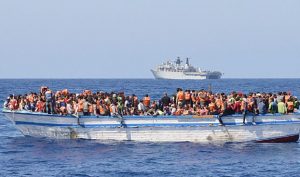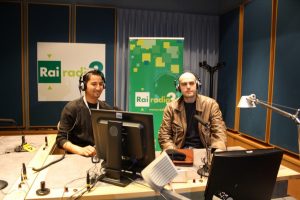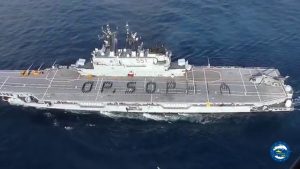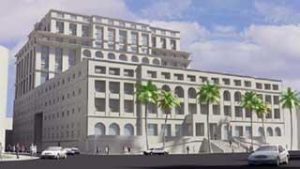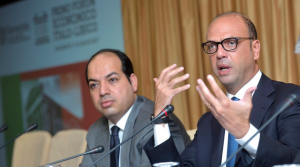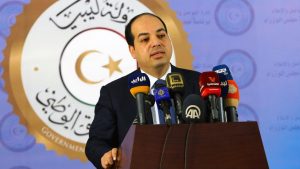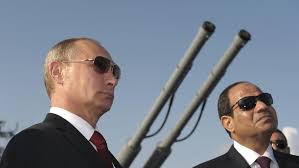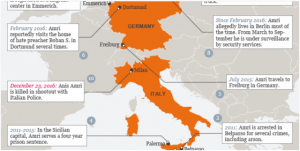TRIPOLI, Aug 29 (Reuters) – Libya’s coastguard rescued nearly 500 migrants on Tuesday at sea west of the capital Tripoli, a spokesman said, underlining the challenge of trying to slow an exodus from Africa and the Middle East.
The migrants included people from sub-Saharan countries, Egypt, Morocco and Tunisia.
“Coastguards rescued early morning today 140 illegal migrants west of Tripoli and another group of 164 migrants were rescued off Sabratha including seven women and six children,” a spokesman for Libya’s naval forces told Reuters.
Later another group of 150 were rescued off Tripoli.
Hundreds of thousands of migrants have crossed the Libyan desert and taken to flimsy boats on the Mediterranean in the hope of reaching Europe in recent years.
A plan was agreed in Paris on Monday by four European countries and three African states, including Libya, to support nations struggling to contain the flow of people.
Leaders agreed on the principle of setting up a mechanism to identify legitimate migrants fleeing war and persecution, and to use the United Nations to register them in Niger and Chad so as to prevent them from being exploited by people smugglers.
Libya has been in turmoil since an uprising six years ago overthrew former leader Muammar Gaddafi.
RSF decries Closure of two Radio Stations in Libya
Reporters Without Borders (RSF) condemns the arbitrary closure of two radio stations in the past few days in Libya – Al Wassat in the eastern part of the country and the local radio station in the western city of Gharyan.
In a post on social media on 27 February, Al Wassat media group chairman Mahmud Shammam reported that the radio station’s transmitter in Tobruk had just been seized by security forces attached to the army that controls eastern Libya.
The same day, Al Wassat’s headquarters in Benghazi was suddenly raided and closed and material was confiscated. The only reason given for its closure was the claim that its signal was interfering with the local government’s broadcasts.
It was the militia in charge of protecting Gharyan’s local radio station that demanded its closure on 23 February without giving any plausible reason. It has not broadcast since then. Attempts to resolve tension between the militia and Gharyan’s local authorities, so that the station can resume broadcasting, have so far been unsuccessful.
“The situation in Libya is extremely worrying and we request the immediate reopening of these radio stations,” RSF editor in chief Virginie Dangles said. “Regardless of the criticisms that can be levelled against them, their closure was sudden, disproportionate and arbitrary, and will only help to block the problematic transition that Libya has been experiencing since 2011.”
Several cases of journalists being the targets of abduction or violence have also been reported to RSF in the western city of Tripoli but the victims are terrified of the many militias operating in the city and have asked not to be identified.
The conflict between the rival governments in the east and west of the country since the start of 2016 has resulted in a climate of complete impunity for crimes of violence and abuses against journalists and media outlets, which makes it very dangerous for them to operate.
Libya is ranked 164th out of 180 countries in RSF’s 2016 World Press Freedom Index.
(Source: Reporters Without Borders)
EU Naval Mission in Mediterranean Extended to end-2018
The European Union has extended the mandate of its naval operation in the Mediterranean – known as EUNAVFOR MED Operation Sophia – until 31 December 2018.
The operation aims at disrupting the business model of migrant smugglers and human traffickers in the Southern Central Mediterranean.
The operation also has two supporting tasks: training the Libyan Coastguard and Navy and contributing to the implementation of the UN arms embargo on the high seas off the coast of Libya in accordance with UN resolutions.
In extending its mandate, the European Council also amended the operation’s mandate to:
set up a monitoring mechanism of trainees to ensure the long-term efficiency of the training of the Libyan Coastguard;
conduct new surveillance activities and gather information on illegal trafficking of oil exports from Libya in accordance with UN resolutions;
enhance the possibilities for sharing information on human trafficking with member states’ law enforcement agencies, FRONTEX and EUROPOL.
Federica Mogherini, the EU’s High Representative for Foreign Affairs and Security Policy, said:
“Two years ago, the European Union’s member states decided unanimously to tackle together one of the most despicable crimes of our times – the trafficking of human beings – by establishing EUNAVFOR Med – Operation Sophia.
“Many suspected smugglers have been apprehended and many lives saved in the Mediterranean Sea, and since last year our women and men serving under the European flag have been also training the Libyan Coastguard and enforcing the arms embargo on the high seas off the coasts of Libya.”
EUNAVFOR MED Operation Sophia was launched on 22 June 2015, as part of the EU’s comprehensive approach to help better manage irregular migration and disrupt traffickers and smugglers’ networks.
Since then, the operation has contributed to the arrest and transfer to the Italian authorities of 110 suspected smugglers and traffickers, and has neutralised 470 vessels. In addition, the operation has helped rescue close to 40,000 lives.
Corinthia Hotel to reactivate international reservation system
Tripoli’s Corinthia Hotel is to reactivate its international reservation system.
Libya herald
The 5-star hotel has in fact been open since early 2016 for meetings, conferences, weddings and other such events, despite suggestions to the contrary. The restaurant has likewise been operating on Fridays for brunch and during the past Ramadan for Iftar.
There have also been a limited number of guests staying at the Corinthia. Room reservations, though, had to be made direct to the hotel.
As well as reactivating the international reservation system, Corinthia also plans to reopen its Tripoli Café and the Venezia restaurant on a daily basis.
It is believed that the reopenings are part of a move to evaluate the market.
Despite the problems, not least in Tripoli, the number of visitors heading there is said to be on the rise, both for business and other matters.
The hotel was subject to a terrorist attack in January 2015 in which nine people died.
Italian Firms gather for Italo-Libyan Economic Forum
Presidency Council deputy Ahmed Maiteeg [Maiteeq] and Italian foreign minister Angelino Alfano have headed up the first Italo-Libyan Economic Forum, held at the weekend in the Sicilian town of Agrigento.
The Forum included discussion on the prospects the Libyan market can offer to Italian companies once security conditions are re-established, as well as the future position of Italian businesses in Libya.
Speakers included representatives of Italian firms such as BonelliErede, IVECO, Cassa Depositi e Prestiti (CDP), SACE, UniCredit, Italferr, Ferrovie dello Stato Italiane (FSI), CNH Industrial, Leonardo (formerly Finmeccanica), Terna Group, TI Sparkle (Telecom Italia), Saipem, Eni, Maire-Tecnimont, Consorzio PMC, Trevi, and Banca UBAE, in addition to the US-based Boston Consulting.
Minister Alfano said:
“Historically Libya has always been an important partner for Italy, from the economic point of view as well as from the political and security standpoint.
“The Italian government is determined to contribute to the stabilisation of the country and return security conditions to relaunch bilateral relations from all standpoints with special focus on economic, infrastructure and energy cooperation.
“The Italian Government wants to strengthen its friendship and cooperation ties with Libya in the field of social and economic development and in particular contribute to the rebuilding of the country.
“We wish to consolidate further the bilateral partnership, based on cooperation in the economic, infrastructure and energy sectors, promoting in both countries further economic and commercial cooperation actions.“
US Considers increasing Libya Presence
The United States is reported to be considering a significant expansion of its involvement in Libya.
CNN says a new diplomatic and military policy could be finalized by the Trump administration in the next few weeks, which could lead to the eventual re-opening of the US embassy and the establishing of a new intelligence sharing effort.
One official told the news agency that the new policy calls for closer cooperation and intelligence sharing with Kalifa Haftar [Hiftar], head of the eastern-based Libyan National Army (LNA).
(Source: CNN)
Libya’s U.N.-backed government moves to take control of wealth fund
Libya’s U.N.-backed government has formed a board of trustees and appointed directors for the country’s contested sovereign wealth fund, moves opposed by others who lay claim to the key financial institution.
The Libyan Investment Authority (LIA), which holds about $66 billion-worth of mostly frozen assets, is the subject a long ownership struggle in a country where rival factions support different governments.
The fund is a potentially important source of income for Libya, whose economy is in crisis because of conflict, diminished oil revenues and bloated public salary and subsidy bills.
The U.N.-backed Government of National Accord (GNA) said the new board of trustees included the GNA’s prime minister, the ministers of finance, planning, and economy, and the governor of the Tripoli’s central bank.
They held an inaugural meeting on Saturday, where they appointed a board of directors made up of members of an LIA steering committee that the GNA nominated in 2016.
“Under the new legal framework, the board of directors will have the full authority to deliver the strategic, operational and legal vision of the LIA, by building an institution that is transparent, accountable and neutral,” a GNA statement said.
Head of the board of directors, Ali Mahmoud Hassan Mohamed, said: “This positive move forward provides us with the mandate and the authority to continue the reform programme we initiated last year.”
The GNA’s steering committee nominated last year was challenged by AbdulMagid Breish, who was appointed LIA chairman in Tripoli in 2013, leading to a struggle for control of the LIA’s main offices in Tripoli.
Breish, who said the committee was illegal because the GNA has never been endorsed by a parliament based in eastern Libya, won a legal appeal against its creation. He has previously said any attempt by the GNA to set up a board of trustees would be “a blatant abuse of power”.
Ali Shamekh, who was appointed chief executive of the LIA by authorities in eastern Libya in 2016, also questioned the latest move by the GNA, saying a board of trustees under Libya’s eastern government had already filed a court appeal against the new, rival board.
The GNA said the formation of its boards was in accordance with a law regulating the LIA and that any move to contest it would be “destabilising”.
A U.N. report last month pointed to losses due to the failure to reinvest LIA investments that have matured, but concluded that it would be difficult to modify the sanctions regime while the fund remained divided.
Russia’s Charm Offensive in North Africa
Its Growing Economic and Military Influence in the Regin With the world’s attention focused on the question of Russian influence in the United States and the European Union, the Kremlin is quietly making inroads in another region critical to both the United States and Europe: the five North African states of the southern Mediterranean shore.
Russian and Algerian officials gathered at a St. Petersburg shipyard last month to shatter a champagne bottle on the first of two so-called Black Hole submarines built for the Algerian navy. The same day, news broke that Russia had deployed special forces and drones to a Soviet-era base in western Egypt to bolster a militia leader in neighboring Libya. Late last year, the secretary of Moscow’s national security council traveled to Morocco, where the king invited Russian President Vladimir Putin to repay the visit he had made to Moscow earlier in the year. And in Tunisia, where Russian tourism jumped tenfold in 2016, the Kremlin signed a deal last autumn to build a nuclear power plant.
Egypt, the world’s largest Arab state, was the jewel in the Soviets’ Middle East crown until it defected to the U.S. camp in the late 1970s, serving as Washington’s most important North African ally ever since. Cairo, however, began systematically expanding its ties with Russia soon after General Abdel Fattah el-Sisi overthrew President Mohamed Morsi in 2013. The administration of Barack Obama, wary of Cairo’s heavy-handed tactics to stamp out dissent, kept some distance from Sisi, who then turned to Russia to help fill the void. In 2015, Putin traveled to Cairo, where the streets were lined with banners bearing his image, and he returned the favor by presenting Sisi with a new Kalashnikov.
In October 2016, Egypt voted with Russia against a UN Security Council resolution that sought to end air strikes in Syria—a vote denounced across the Arab world as a bid to curry favor with Moscow. Weeks later, the two nations held their first-ever joint military drill, which they named Defenders of Friendship.
Tunisia, Libya reach deal on Ras Jedir border trade
Tunisian and Libyan parties on Tuesday reached a deal to resume vital trade through the Ras Jedir crossing point after a week of unrest, a source close to the negotiations told media.
Flow of goods via Ras Jedir border crossing will resume as of January 22 pending the resolution of the computer system issue at the border crossing from the Libyan side, as was agreed at a security meeting held on Tuesday at the Ras Jedir crossing border between senior Tunisian and Libyan officials, Governor of Medenine Tahar Matmati told media.
It was also decided to reactivate provisions agreed on in the previous Tunisian-Libyan meeting held in May 2016 under the chairmanship of the governor (Tunisian side) concerning the training of a joint commission for monitoring the situation at the crossing point and authorising passenger cars to transport a limited quantity of goods.
Ras Jedir is the main crossing between western Libya and southeastern Tunisia, a region largely dependent on cross-border trade, both legal and illegal.
For around a week, social unrest has rocked the Tunisian border town of Ben Guerdane, with demonstrators demanding the free flow of trade through the frontier.
On Tuesday, protesters were still blocking the road from Ras Jedir to Ben Guerdane, where calm had returned after the clashes between demonstrators and the police.
A previous deal for a new customs system was signed in May 2016 after a previous wave of unrest over paralysed trade at the border, but was never implemented.
Tensions have been high in recent months, with a part of the population accusing the authorities of ignoring their plight.
Training session on methodology for conducting polls
The second training session on the methodology for conducting polls was launched, on Monday in Tunis, with the participation of twelve young people from different Libyan regions.
This three-day session, supported by the German Hanns Seidel Foundation, is the second event held by the Maghreb Centre for researches on Libya in collaboration with the Tunisian ”Sigma Conseil” Institution” specialized in opinion polls.
The training, meant to train Libyan youth to carry out opinion polls which were banned or fake during the dictatorship era, is a sign of the democratic climate for the future.
المركز المغاربي للأبحاث حول ليبيا
تعريف:
تأسس المركز المغاربي للأبحاث حول ليبيا في جوان - يونيو 2015 في تونس، وهو أول مركز من نوعه يعمل بكل استقلالية من أجل تعميق المعرفة بليبيا في جميع المجالات والقطاعات، ويرفد بالمادة العلمية جهود المجتمع المدني في ليبيا لإقامة الحكم الرشيد، المبني على التعددية والتداول السلمي واحترام حقوق الإنسان . مؤسس المركز: الإعلامي والباحث التونسي رشيد خشانة يقوم المركز بنشر مقالات وأوراق بحثية بالعربية والأنكليزية والفرنسية، ويُقيم مؤتمرات وندوات علمية، وباكورة نشاطاته ندوة حول "إسهام المجتمع المدني في إعادة الاستقرار والانتقال الديمقراطي بليبيا" يومي 5 و6 أكتوبر 2015 بتونس العاصمة.
موقع "ليبيا الجديدة"
موقع إخباري وتحليلي يبث الأخبار السريعة والتقارير السياسية والاقتصادية والثقافية والاجتماعية عن ليبيا، ديدنُه حق المواطن في الإعلام، ورائدُه التحري والدقة، وضالتُه الحقيقة، وأفقهُ المغرب العربي الكبير. يتبنى الموقع أهداف ثورة 17 فبراير ومبادئها السامية ويسعى للمساهمة في بناء ليبيا الجديدة القائمة على الديمقراطية واحترام حقوق الانسان والحكم الرشيد.

